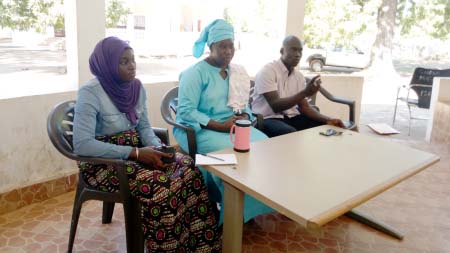
Neneh
Touray, assistant director of Information, Education and Communication for
Women’s Bureau has renewed her bureau’s commitment to combat the menace of
Female Genital Mutilation/Cutting and child marriage among other pertinent
issues affecting women in the country.
“Women’s
Bureau has been working tirelessly in ensuring that the menace of FGM/C among
other negative issues affecting our women’s development is completely
eradicated in our society. We want people to live in a society where our women
and girls are not subject to any forms of violence or harassment.”
She
was speaking on Wednesday at the governor’s Bantaba in Basse-Mansajang as the
Women’s Bureau began information sharing sessions with community leaders,
technical advisory members and district chief executives among others. The
outreach is being funded by UNICEF.
FGM/C,
she added, is a harmful traditional practice that is affecting women and girls,
saying that all hands must be on deck in ensuring that the menace is stamped
out in the country.
“The
significance of the information sharing cannot be over emphasised for the fact
that it will enable the participants who are part of decision makers within
their respective communities to be able to get the necessary information on the
negative as well as the health implications involved in the practice so that
they can enlighten their communities.”
She
said lot of sensitisation has been conducted by various players on issues
surrounding the menace. However, there’s still vital information that needs to
get to the public so that the message can filter to the grassroot levels.
“The
grassroot levels need to get the information so that they can work closely with
their people so as to enable us eradicate the deeply rooted cultural practice
in our country. We want them to get the knowledge so that they can filter the
right information to the public.”
The
Women’s Bureau assistant director of Information, Education and Communication
said the only way to convince people to stop practicing FGM/C among other negative harmful practices
within our societies is by building their capacities so that they can know some
of the health complications involved in the menace.
She
added that due to the sensitisation that her office and other players are
conducting in the country, the menace of FGM/C has drastically reduced. “The
number of circumcised children between the age 0-14 have reduced which indicate that there’s
massive progress going on. We can’t completely eradicate it just one day but I
am optimistic that it will be stamped out in the country.”
Sira
Bah, community health nurse and midwife said: “Seventy-six percent of
reproductive age women in The Gambia have undergone FGM/C. The practice has
immediate and long-time negative health consequences. The immediate health
consequences include infection, bleeding, severe pain and shock.”
She
added that it also has long term excessive scars, infection, birth
complications in the new born, sexual difficulties as well as psychological
complications.

